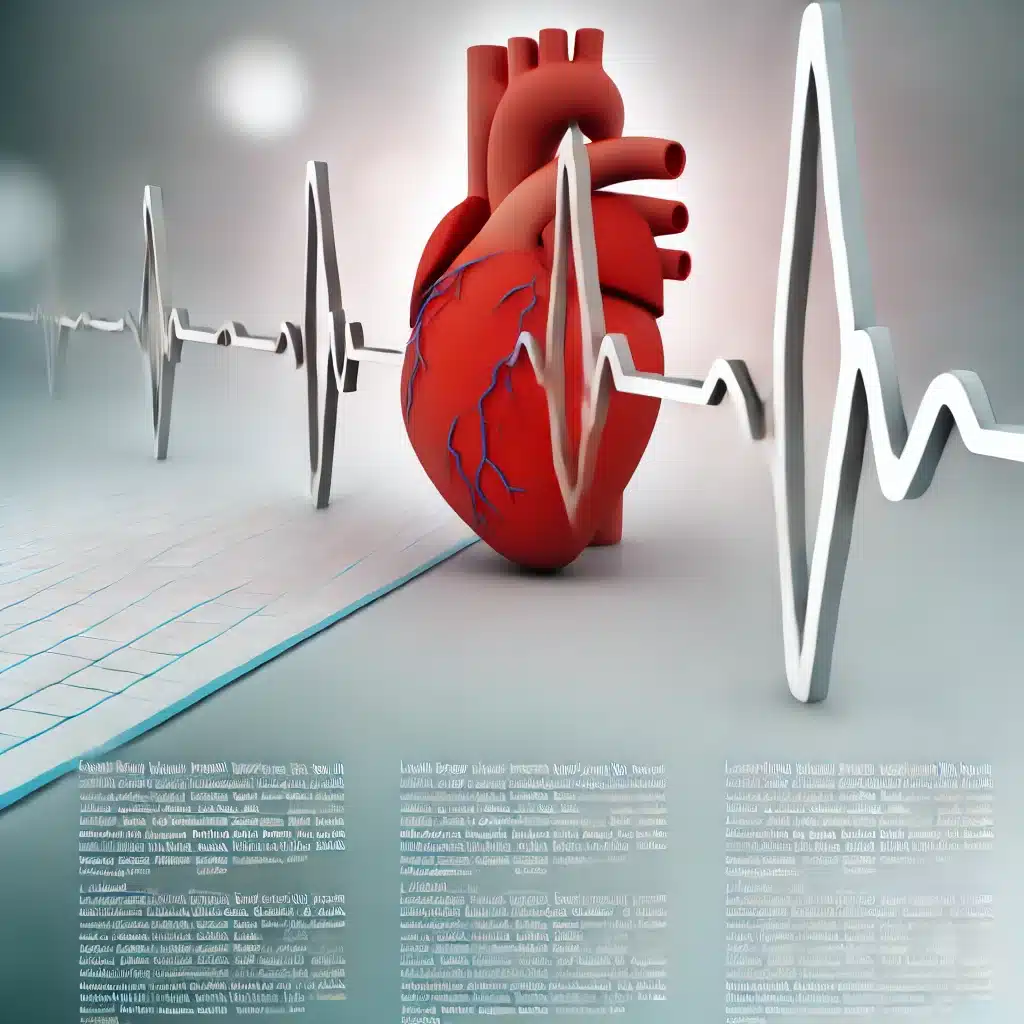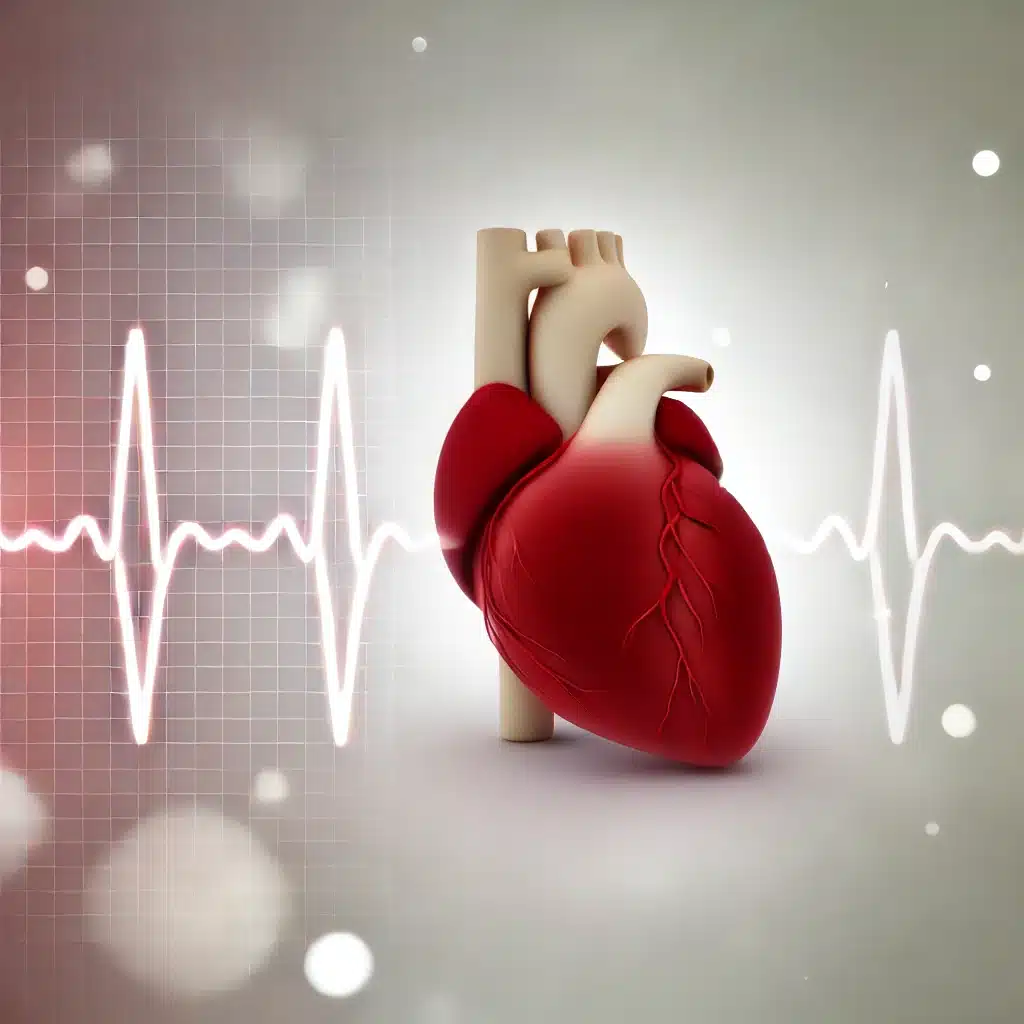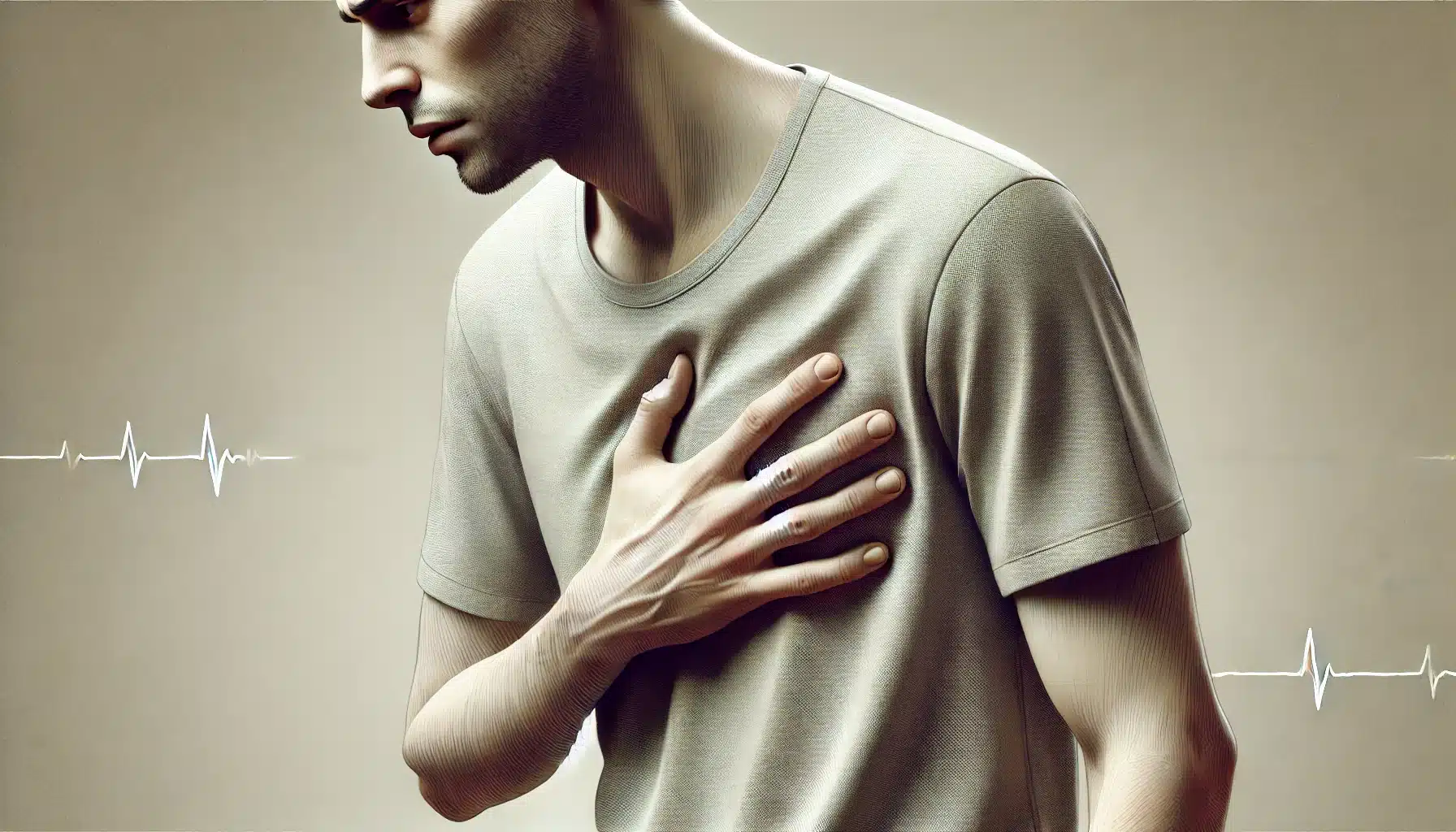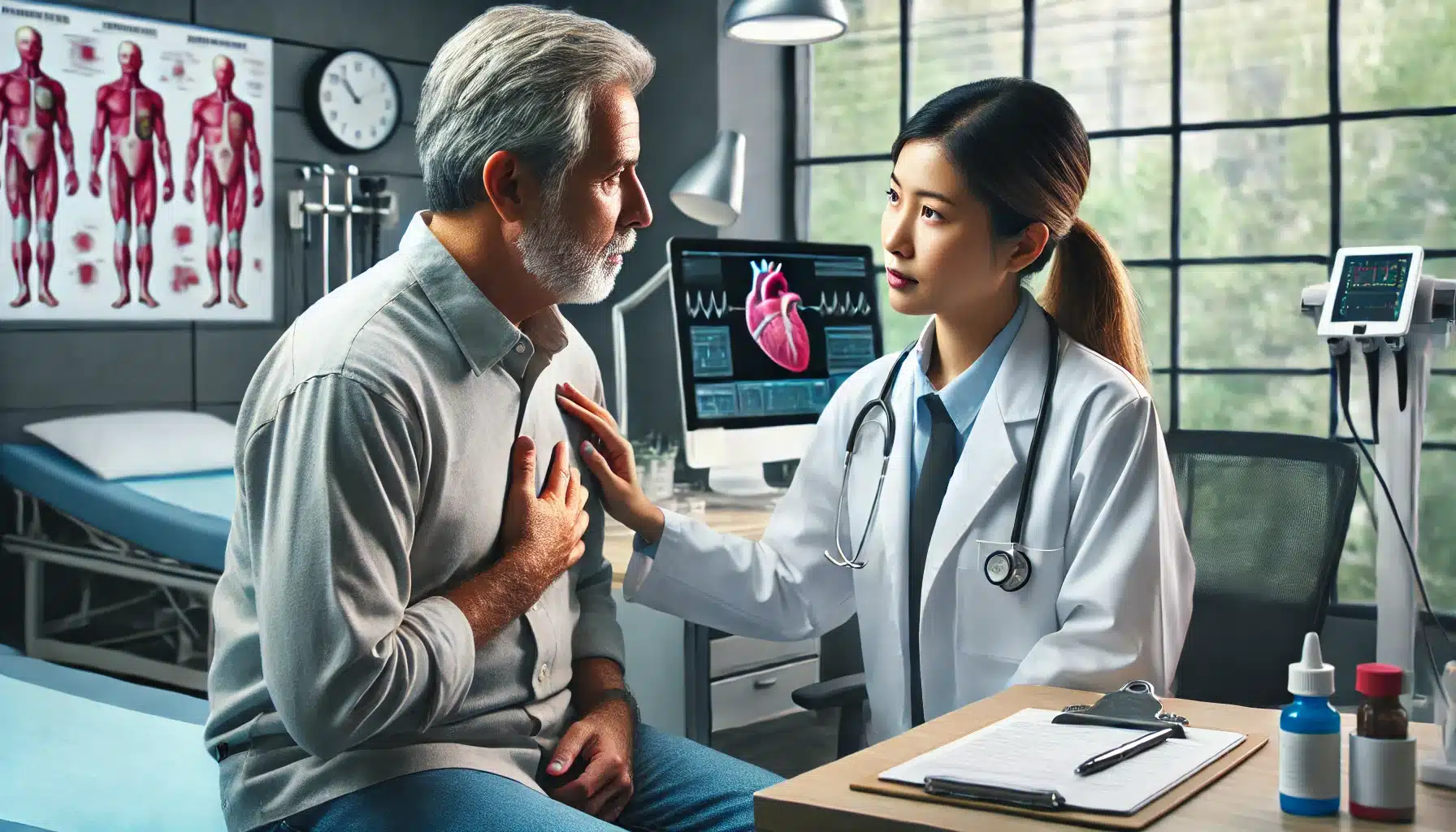What Causes Chest Pain?
Chest pain can be a distressing experience, but not all chest pain is a cause for alarm. Understanding the common causes can help differentiate between when to seek immediate medical attention and when it’s less urgent. Chest pain may stem from various sources, including heart-related issues, digestive problems, lung conditions, or musculoskeletal causes. Recognizing the nature of the pain—whether it is sharp, dull, constant, or intermittent—can offer important clues about its origin.
In this guide, we’ll explore the most common causes of chest pain, their symptoms, and when you should consult a healthcare professional. By being informed, you can manage your health better and avoid unnecessary panic.
- Heart-Related Causes: These are often the most concerning and can include conditions like angina or a heart attack.
- Digestive Causes: Issues such as acid reflux or ulcers can also lead to discomfort in the chest area.
- Lung-Related Causes: Conditions like pneumonia or a pulmonary embolism may present with chest pain.
- Musculoskeletal Causes: Muscle strain or rib injuries are common, non-life-threatening sources of chest pain.
1. Heart-Related Causes
 Heart-related causes of chest pain are usually the most serious and require immediate medical attention. The pain may be due to conditions such as:
Heart-related causes of chest pain are usually the most serious and require immediate medical attention. The pain may be due to conditions such as:
- Angina: This occurs when the heart muscle doesn’t receive enough oxygen-rich blood. It’s often felt as a pressure or squeezing in the chest and can be triggered by physical exertion or stress.
- Heart Attack: A more severe condition than angina, a heart attack occurs when blood flow to the heart is completely blocked. Symptoms include intense chest pain, shortness of breath, sweating, and nausea. Unlike angina, heart attack pain doesn’t improve with rest.
- Pericarditis: Inflammation of the sac surrounding the heart (pericardium) can cause sharp, stabbing chest pain that worsens when lying down or taking deep breaths.
- Aortic Dissection: A rare but life-threatening condition where the inner layer of the aorta tears, causing severe, sudden chest pain that may radiate to the back.
If you experience any of these symptoms, it is crucial to seek emergency medical care immediately. Delaying treatment can result in severe complications or even death.
2. Digestive Causes
Digestive issues can often mimic heart-related chest pain, making it challenging to distinguish between the two. Common digestive causes of chest pain include:
- Acid Reflux (GERD): Gastroesophageal reflux disease (GERD) occurs when stomach acid flows back into the esophagus, causing a burning sensation in the chest known as heartburn. This pain can be mistaken for heart pain but is usually relieved by antacids or changes in body position.
- Esophageal Spasms: Sudden, painful contractions of the esophagus can cause intense chest pain that may feel similar to a heart attack. This condition often occurs when swallowing food or liquid.
- Hiatal Hernia: This condition occurs when part of the stomach pushes through the diaphragm into the chest cavity, leading to chest pain, especially when bending over or lying down.
- Peptic Ulcers: Sores that develop on the inner lining of the stomach or upper small intestine can cause a burning pain that radiates to the chest. The pain typically worsens on an empty stomach.
- Gallbladder Disease: Gallstones or inflammation of the gallbladder can lead to intense pain in the upper abdomen that may radiate to the chest, often after eating fatty meals.
While digestive-related chest pain is usually less severe than heart-related causes, persistent or severe pain should still be evaluated by a healthcare provider to rule out serious conditions.
3. Lung-Related Causes
Chest pain originating from the lungs is another common cause that can vary in severity. Some of the lung-related causes include:
- Pneumonia: An infection in the lungs that can cause sharp or stabbing chest pain, especially when taking deep breaths or coughing. Other symptoms include fever, chills, and difficulty breathing.
- Pulmonary Embolism: A serious condition where a blood clot travels to the lungs, causing sudden, severe chest pain, shortness of breath, rapid heartbeat, and coughing up blood. This is a medical emergency and requires immediate attention.
- Pleurisy: Inflammation of the lining of the lungs (pleura) can lead to sharp chest pain that worsens with breathing, coughing, or sneezing.
- Pneumothorax (Collapsed Lung): A collapsed lung occurs when air leaks into the space between the lung and chest wall, causing sudden chest pain and shortness of breath. This can happen spontaneously or due to chest injury.
- Asthma: Asthma attacks can sometimes present with chest tightness or pain along with wheezing and difficulty breathing.
Lung-related chest pain can be serious, especially if accompanied by symptoms such as severe shortness of breath or coughing up blood. Prompt medical evaluation is recommended in these cases.
4. Musculoskeletal Causes
Musculoskeletal issues are among the most common and least worrisome causes of chest pain. This type of pain often results from problems with the muscles, bones, or joints in the chest. Some of the common musculoskeletal causes include:
- Muscle Strain: Overuse or injury to the chest muscles, such as from heavy lifting, intense exercise, or trauma, can cause sharp or aching pain that worsens with movement or touch.
- Costochondritis: Inflammation of the cartilage that connects the ribs to the breastbone (sternum) can lead to localized pain that is often described as sharp or stabbing. It is typically aggravated by pressing on the chest or taking deep breaths.
- Rib Fractures: A broken rib can result in significant pain that worsens with deep breaths, coughing, or movement. This type of pain is usually sharp and localized to the area of the fracture.
- Fibromyalgia: A chronic condition characterized by widespread musculoskeletal pain, including chest pain. It is often accompanied by fatigue, sleep disturbances, and mood issues.
- Thoracic Outlet Syndrome: This condition occurs when the nerves or blood vessels between the collarbone and first rib are compressed, leading to pain in the chest and arm, as well as numbness or tingling.
Musculoskeletal chest pain is generally less severe and often improves with rest, over-the-counter pain relievers, or physical therapy. However, persistent pain should still be evaluated by a healthcare provider to ensure proper diagnosis and treatment.
When Should You See a Doctor?
 Determining when to seek medical attention for chest pain can be challenging, but there are specific warning signs that should not be ignored. It is essential to see a doctor if you experience any of the following symptoms:
Determining when to seek medical attention for chest pain can be challenging, but there are specific warning signs that should not be ignored. It is essential to see a doctor if you experience any of the following symptoms:
- Severe, sudden chest pain: Intense pain that comes on suddenly and doesn’t go away with rest may indicate a heart attack or other serious condition.
- Pain that radiates: Chest pain that spreads to the arms, back, neck, jaw, or shoulders should be evaluated immediately, as this can be a sign of a heart attack.
- Shortness of breath: Difficulty breathing, especially if it occurs suddenly or is accompanied by chest pain, can be a sign of a heart or lung problem.
- Sweating, nausea, or dizziness: These symptoms, along with chest pain, are often associated with heart-related issues and require urgent medical attention.
- Pain that worsens with exertion: If your chest pain intensifies with physical activity and eases with rest, it could be related to a heart condition such as angina.
- Persistent or recurring pain: Any chest pain that persists or keeps coming back, even if it’s mild, should be evaluated by a healthcare provider to rule out serious conditions.
While not all chest pain is life-threatening, it is always better to err on the side of caution. Seeking prompt medical advice can prevent potential complications and provide peace of mind.
How to Differentiate Chest Pain Causes?
Understanding the different characteristics of chest pain can help you identify its possible causes. Here are some tips on how to differentiate between common sources of chest pain:
- Heart-Related Pain: Typically felt as pressure, squeezing, or a tight sensation in the center of the chest. It may radiate to the arms, neck, jaw, or back. Heart-related pain is often triggered by physical exertion or stress and does not improve with rest if it’s a heart attack.
- Digestive-Related Pain: This pain is usually described as a burning sensation and is often related to eating or lying down. It may improve with antacids and is commonly associated with symptoms like bloating or acid taste in the mouth.
- Lung-Related Pain: Lung-related pain is often sharp and worsens with deep breaths, coughing, or physical activity. Conditions like pleurisy or pneumonia may also present with fever and breathing difficulties.
- Musculoskeletal Pain: This type of pain is typically localized, sharp, and worsens with movement, touch, or breathing. It often results from an identifiable cause such as an injury or strain.
To accurately determine the cause of chest pain, healthcare providers may use diagnostic tests such as electrocardiograms (ECGs), chest X-rays, blood tests, or stress tests. Always consult a healthcare professional if you are uncertain about the nature of your chest pain.
Frequently Asked Questions About Chest Pain
1. What should I do if I experience chest pain?
If you experience chest pain that is severe, sudden, or accompanied by symptoms such as shortness of breath, sweating, or pain radiating to other parts of your body, seek emergency medical care immediately. For mild or persistent pain, schedule an appointment with your healthcare provider for further evaluation.
2. Can anxiety cause chest pain?
Yes, anxiety and panic attacks can cause chest pain that mimics heart-related pain. This type of pain is often sharp, intense, and may be accompanied by rapid breathing, dizziness, or a feeling of impending doom. While anxiety-induced chest pain is not life-threatening, it is important to rule out other serious causes with a healthcare provider.
3. How can I prevent chest pain related to digestive issues?
To prevent chest pain related to digestive issues such as acid reflux, try eating smaller meals, avoiding trigger foods (like spicy or fatty foods), not lying down immediately after eating, and maintaining a healthy weight. Over-the-counter antacids or prescribed medications can also help manage symptoms.
4. Is chest pain always related to heart problems?
No, chest pain is not always related to heart problems. It can be caused by a variety of conditions, including digestive issues, lung conditions, and musculoskeletal problems. Identifying the characteristics of the pain and accompanying symptoms can help determine its cause.
5. Can exercise cause chest pain?
Yes, exercise can cause chest pain, particularly if it leads to muscle strain or if you have an underlying heart condition like angina. It’s important to warm up properly, not overexert yourself, and pay attention to any warning signs of heart-related pain, especially if the pain persists or worsens with exertion.


